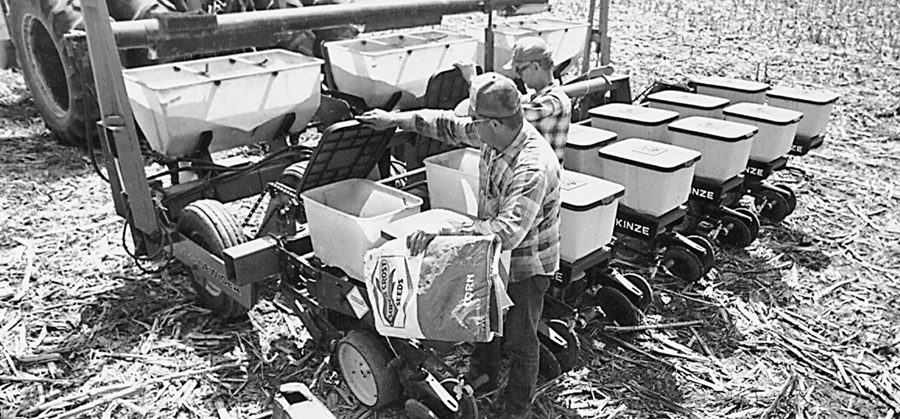When it comes to selecting the critical traits found with hybrids which perform best under various tillage systems, farmers attending the 1998 National No-Tillage Conference in Indianapolis, Ind., cited significant differences.
Early Growth
Both slower and erratic emergence under no-till conditions were the chief concerns mentioned by farmers. This was followed closely by a lack of early vigor in cool, wet soils.
Other farmers felt early growth ratings aren’t as good and root and stalk strength isn’t as strong with no-till. Other farmers mentioned uneven germination due to soil temperatures.
Yet, one grower reversed the normal concerns. He didn’t feel high-yielding corn grown with conventional tillage had as uniform emergence as no-tilled corn grown under more extreme conditions. Still another farmer maintains yields are higher and weed pressures lower with no-tilled corn.
Temperature And Disease
Cold tolerance and a lack of disease resistance with no-till were concerns voiced by many farmers.
Northern Differences
“For the Northern geographies where no-till adoption is slow, I suspect hybrid characteristics are extremely important relative to cold tolerance,” says Pete Hill, a conservation tillage specialist for Monsanto at Urbandal, Iowa. “Therefore, improvements specific to this issue could benefit the adoption curve.”
Others felt there is better dry-weather tolerance among hybrids with no-till. Some even feel no-till corn outperforms conventional tillage in dryland areas.
Another farmer says his farm almost always has a dry spell for at least a few weeks during the summer. As a result, his no-till corn doesn’t show the drought stress as much and produces higher yields when compared to corn grown with other tillage systems.
Yields And Stands
Losses in yield, slower growth and uneven stands with no-till were other concerns. One farmer even finds his favorite hybrid yields 10 bushels per acre less with no-till due to reduced rooting depth.
Crop maturity was also a concern. Recognizing that no-till corn takes more time to mature, one farmer no-tills only 97- day or earlier corn. Another pointed out that since both no-till corn and soybeans mature later, he no-tills these crops a few days earlier than his neighbors.
Suited For No-Till
Most farmers maintain you need to realize some hybrids simply are not suited for no-till. On the other hand, proper selection means some hybrids perform much better with no-till. For example, some no-till hybrids produce higher yields by making more effective use of available soil moisture and nutrients. Other hybrids yield better under a cooler, wetter no-till environment.
Many feel hybrids haven’t been bred for no-till. The tilth of the soil, more earthworms and improved soil moisture were other reasons cited for favoring specific hybrids under no- till.
Early Growth Critical
Strong emergence, early vigor in cool and wet soils, improved disease resistance, drought tolerance and increased hardiness under cold conditions are traits farmers look for in no-till hybrids.
Several farmers select hybrids for high stress regardless of what tillage system is used. Other farmers stress disease resistance, particularly gray to leaf spot.
Still other farmers no-till a shorter maturity corn, choose hybrids bred specifically for no-till conditions and look for hybrids offering flex-ear traits—especially with hybrids highly rated for stress and use under no-till conditions.
A few growers even prefer taller corn since it canopies better with no-till and helps reduce weed control costs.
Stay Close To Home
The survey respondents also felt it was critical to choose hybrids for no-till from on-farm or locally conducted yield plot trials. They stressed the importance of actual historical performance under no-till conditions.
“While many farmers participating in this survey seem to be relatively satisfied with available hybrids, current work designed to improve hybrid performance under no-till conditions will benefit them greatly,” says Hill. For them, a good no-till hybrid will become even better.”







